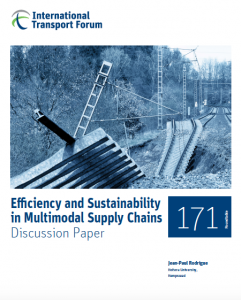 Efficiency improvements are inherent to the sustainability of global supply chains. Supply chains are highly dependent on a diversity of material flows handled by numerous actors (suppliers, carriers, manufacturers, distributors, etc.) and the efficiency of these flows impacts the environmental performance of the supply chain. Yet, there is no particularly clear strategy about improving the efficiency of supply chains, notably from an environmental perspective. The debate about whether environmental efficiency is better achieved through innovation and market competition as opposed to environmental standards imposed by regulations is ongoing in sustainable transportation. Irrespective, further levels of integration along supply chains, supported by multimodalism, are expected to derive direct (less emissions) and indirect (better use of resources) benefits.
Efficiency improvements are inherent to the sustainability of global supply chains. Supply chains are highly dependent on a diversity of material flows handled by numerous actors (suppliers, carriers, manufacturers, distributors, etc.) and the efficiency of these flows impacts the environmental performance of the supply chain. Yet, there is no particularly clear strategy about improving the efficiency of supply chains, notably from an environmental perspective. The debate about whether environmental efficiency is better achieved through innovation and market competition as opposed to environmental standards imposed by regulations is ongoing in sustainable transportation. Irrespective, further levels of integration along supply chains, supported by multimodalism, are expected to derive direct (less emissions) and indirect (better use of resources) benefits.
The OECD International Transport Forum (ITF) brings the efficiency and sustainability in multimodal supply chains at the centre of discussions with PortEconomics member Jean-Paul Rodrigue to describe approaches in intermodal supply chain management that aim to balance efficiency with sustainability requirements set by firms’ corporate social responsibility commitments and society more generally. The discussion papers explores how accreditation systems can help support green logistics efforts and outlines the competitive advantages and disadvantages of adopting these approaches.
Download the Report
You might download the report via the relevant OECD website: Rodrigue, J.P. (2018), “Efficiency and Sustainability in Multimodal Supply Chains”, International Transport Forum Discussion Papers, OECD Publishing, Paris.












